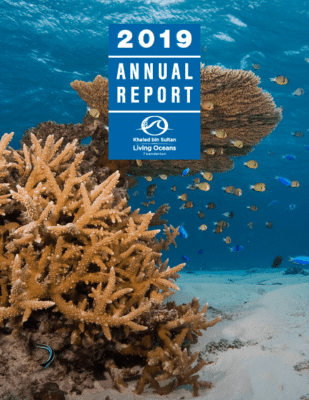2019 Annual Report
(2020)
Please find an excerpt of the full PDF below
 The Khaled bin Sultan Living Oceans Foundation (KSLOF) had a very successful year. We published a number of peer-reviewed publications, including our Global Reef Expedition mapping paper in the prestigious journal, Coral Reefs. This paper showed how we used satellite data combined with field observations to create the largest collection of high-resolution coral reef maps ever made. The foundation also published our findings from the largest coral reef survey and mapping expedition ever conducted in French Polynesia and shared our report with government officials, park managers, stakeholders, and conservation organizations so it could be used for marine conservation. Both of these reports received extensive coverage in top-tier news outlets, including Science magazine, due to KSLOF’s extensive media outreach efforts.
The Khaled bin Sultan Living Oceans Foundation (KSLOF) had a very successful year. We published a number of peer-reviewed publications, including our Global Reef Expedition mapping paper in the prestigious journal, Coral Reefs. This paper showed how we used satellite data combined with field observations to create the largest collection of high-resolution coral reef maps ever made. The foundation also published our findings from the largest coral reef survey and mapping expedition ever conducted in French Polynesia and shared our report with government officials, park managers, stakeholders, and conservation organizations so it could be used for marine conservation. Both of these reports received extensive coverage in top-tier news outlets, including Science magazine, due to KSLOF’s extensive media outreach efforts.
This year KSLOF celebrated the 5-year anniversary of our mangrove outreach and education program in Jamaica, and launched a new mangrove program focused on mangrove disease. Working with our partner Dr. Ryann Rossi, we launched the Mangrove Detectives program. This program provides free lesson plans and a science kit to classrooms so they can participate in an international citizen-science project to collect data about disease and herbivory in mangrove forests. It is funded by National Geographic and is a major expansion of our work with Dr. Rossi to look for signs of disease in mangrove forests as part of our ongoing mangrove outreach and education program in The Bahamas. The foundation was also thrilled to receive over 350 entries to our student art contest, the Science Without Borders® Challenge. “Connected Ocean: No Barriers, No Boundaries, and No Borders” was the theme for our 7thannual Challenge. Middle and high school students were asked to send in artwork illustrating how the oceans are connected, and we couldn’t be more pleased with our winning entries.
Other projects KSLOF worked on this year include helping King Abdullah University of Science and Technology (KAUST) analyze coral reef photo transects from the Red Sea, and re-mapping shallow water habitats of the Farasan Banks for the Red Sea Research Center and comparing those to maps we made in 2009. We also continue our work to build a coral reef resiliency modeling using data collected on the Global Reef Expedition while we examine our data to see if there is evidence of global-scale human impacts to coral reefs.
2019 Annual Report
